In June, the U.S. celebrates Pride Month, in honor of the 1969 Stonewall Uprising. Across the country, people gather with parades, events, parties, and other celebrations to honor the history and impact of the LGBTQ+ community. This post highlights podcasts, literature, and archives that document the rich array of lived experiences of LGBTQ+ individuals.
Whether you are exploring your own identity or want to build your allyship capacities, we hope that this month’s materials provide you meaningful ways to learn about our vibrant community.
- Catalina Piatt-Esguerra, she/hers (Associate Dean for Inclusion, Diversity, Equity, and Accessibility)
First, from Amanda Wyatt Visconti, they/them, (Managing Director of Scholars’ Lab):
The “Gender Reveal” podcast
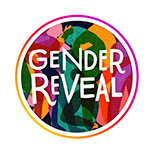 The “Gender Reveal” podcast interviews a diverse array of trans, nonbinary, intersex, and two-spirit people. Whether you want to be a better ally, explore your gender, or just hear about a broad array of trans lives, the show connects you to a variety of lived trans experiences (including activism, creativity, work, and joy), rather than only transition or tragedy. You can listen through various platforms or read episode transcripts if you prefer. “Starter packs” collect episodes to start listening to specific kinds of interviewees, including trans authors, actors, Indigenous and two-spirit folks, social justice and union activists, and academics.
The “Gender Reveal” podcast interviews a diverse array of trans, nonbinary, intersex, and two-spirit people. Whether you want to be a better ally, explore your gender, or just hear about a broad array of trans lives, the show connects you to a variety of lived trans experiences (including activism, creativity, work, and joy), rather than only transition or tragedy. You can listen through various platforms or read episode transcripts if you prefer. “Starter packs” collect episodes to start listening to specific kinds of interviewees, including trans authors, actors, Indigenous and two-spirit folks, social justice and union activists, and academics.
Zines!
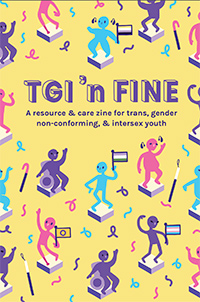 Zines are DIY self-publications, often small paper booklets easily replicated on copy machines and distributed for free. They’ve historically been a low-barrier way for LGBTQIA+ folks to share advice and art with one another. UVA’s library catalog offers an array of zines and zine-related reads; and when the main library completes its renovation you’ll be able to visit the Scholars' Lab zine wall on the third floor to grab as many free zines on LGBTQIA+ and other topics as you want! For now, here are a couple of LGBTQIA+ zine resources you can access online:
Zines are DIY self-publications, often small paper booklets easily replicated on copy machines and distributed for free. They’ve historically been a low-barrier way for LGBTQIA+ folks to share advice and art with one another. UVA’s library catalog offers an array of zines and zine-related reads; and when the main library completes its renovation you’ll be able to visit the Scholars' Lab zine wall on the third floor to grab as many free zines on LGBTQIA+ and other topics as you want! For now, here are a couple of LGBTQIA+ zine resources you can access online:
- “Embodiment: Secrets Under Our Skin” by the Feminist Union of Charlottesville Creatives for “profoundly personal stories, poems, and creative artworks conceived from radical bodily exploration.”
- “TGI 'n fine: A resource & care zine for trans, gender non-conforming, & intersex youth” by the LYRIC Center for LGBTQQ Youth, with advice for exploring and navigating gender transition.
- Barnard College’s Zine Library offers links to many free digital zines by women, nonbinary people, and trans men, with emphasis on zines by women of color and a newer effort to acquire more zines by trans women; as well as resources on how to make your own zines.
Second, from Brenda Gunn, she/her/hers (Associate University Librarian for Special Collections and Preservation):
“The Black Flamingo”
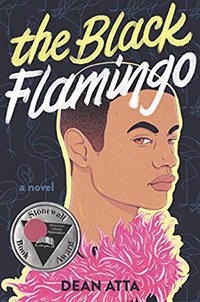 Dean Atta’s debut novel, “The Black Flamingo” (on order for UVA Library), is a banned book in several locales and states. First published in Great Britain in 2019, Atta’s book launched in the U.S. a year later and met challenges calling for the removal of this young adult novel from library shelves. Atta writes in verse to tell the story of Michael as he transitions from living at home in London with his mother and younger sister, to enrolling in a nearby university to study English in the hopes of becoming a writer. Michael is mixed race; his father is of Jamaican descent and his mother is Greek. He is also gay. Michael moves through novel spaces as a university student and gains strength and motivation from his new experiences, especially with the Drag Society. As he develops his drag persona — the black flamingo — and settles into this group space of acceptance, Michael defines himself in defiance of all those who would try to do that for him. Winner of multiple awards, including the Stonewall Book Award from the American Library Association, “The Black Flamingo” should appear on only one list: must read.
Dean Atta’s debut novel, “The Black Flamingo” (on order for UVA Library), is a banned book in several locales and states. First published in Great Britain in 2019, Atta’s book launched in the U.S. a year later and met challenges calling for the removal of this young adult novel from library shelves. Atta writes in verse to tell the story of Michael as he transitions from living at home in London with his mother and younger sister, to enrolling in a nearby university to study English in the hopes of becoming a writer. Michael is mixed race; his father is of Jamaican descent and his mother is Greek. He is also gay. Michael moves through novel spaces as a university student and gains strength and motivation from his new experiences, especially with the Drag Society. As he develops his drag persona — the black flamingo — and settles into this group space of acceptance, Michael defines himself in defiance of all those who would try to do that for him. Winner of multiple awards, including the Stonewall Book Award from the American Library Association, “The Black Flamingo” should appear on only one list: must read.
Third, from M. Grace Hale, she/hers (Reference Librarian):
“The Mimicking of Known Successes”
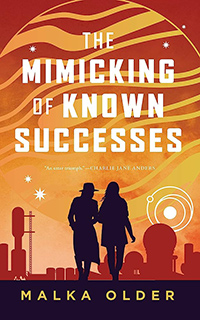 The Mimicking of Known Successes (on order for UVA Library), is a beautifully written novella. Maika Older, the author of the critically acclaimed “Centenal Cycle” series, introduces a cozy sapphic mystery, complete with tea, scones, an elite university, and a gender-bending Sherlockian/Watsonian team. The storyline manages to combine eco-criticism and post-apocalyptic politics with a lightness of heart that keeps you wanting more. The twist is that the story is set on Jupiter where humans have retreated after climate collapse made Earth uninhabitable. Humans have retained a foothold in the solar system by building a colony of ring-like habitats connected by light rail lines around Jupiter but dream of rehabilitating Earth.
The Mimicking of Known Successes (on order for UVA Library), is a beautifully written novella. Maika Older, the author of the critically acclaimed “Centenal Cycle” series, introduces a cozy sapphic mystery, complete with tea, scones, an elite university, and a gender-bending Sherlockian/Watsonian team. The storyline manages to combine eco-criticism and post-apocalyptic politics with a lightness of heart that keeps you wanting more. The twist is that the story is set on Jupiter where humans have retreated after climate collapse made Earth uninhabitable. Humans have retained a foothold in the solar system by building a colony of ring-like habitats connected by light rail lines around Jupiter but dream of rehabilitating Earth.
The central mystery concerns an unidentified man who goes missing on one of the provincial rail stations, and the shadowy agency that appears to deal with it. Mossa, an investigator, is called on to look into the disappearance. When the missing man turns out to be a scholar from Valdegeld, home to the colony’s elite university, Mossa decides to call on Pleiti, a Classics scholar, to get the inside scoop on faculty life. Pleiti is a specialist in pre-collapse Earth ecosystems and may or may not still have a candle burning for Mossa after their college romance ended badly years before.
The novella pokes wicked fun at the foibles of academia and the dangers of a nostalgia ethos, using minimalist strokes to build a world that leaves the reader wanting to know more. The mystery unfolds on the storm-plagued Valdegeld platform and eventually collides with political maneuvering around the colony’s efforts to repopulate Earth’s ecosystem so humans can someday return. The tone manages to be both cozy and atmospheric, touching with a light hand on the politely cutthroat world of elite research institutions as well as the human capacity for hope.
Lastly, from Mandy Rizki, she/her/hers, (Reference Librarian):
Digital Transgender Archive
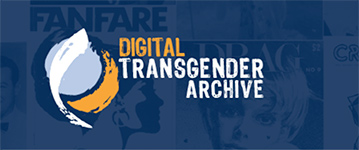
The Digital Transgender Archive is an online database compiling archival material from the lives and experiences of transgender people, with more than seventy institutions contributing from around the world. The database can be searched by collection, keyword, or tagged location – meaning photos of trans folks in Berlin in 1920 are tagged in Berlin on a world map, even though they are physically in the Human Sexuality Collection at Cornell! Items in the database include 1990s newsletters from the East Coast FTM group, photographs from the 1978 ‘Gay Day’ parade in San Francisco, newspaper clippings from Sao Paulo, correspondence, and so much more.
